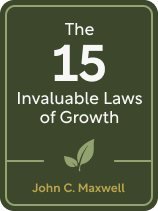

This article is an excerpt from the Shortform book guide to "The 15 Invaluable Laws of Growth" by John C. Maxwell. Shortform has the world's best summaries and analyses of books you should be reading.
Like this article? Sign up for a free trial here.
Do you struggle to get things done? Do you feel like you never make progress toward your goals? Are you ready to give up?
According to John Maxwell, motivation makes it easier to reach your goals. But, it must be consistent to be effective. You probably already know that part but wonder how to stay motivated for the long haul. Maxwell offers two practical ways to do this.
Read more to learn how to keep yourself motivated until you cross the finish line.
How to Keep Yourself Motivated
If you’re ready to grow and realize your potential, you can find oodles of insights in The 15 Invaluable Laws of Growth by John C. Maxwell. Motivation, he explains, makes it easier for you to take steady, thoughtful action toward your goals. That motivation must be consistent. Maxwell offers two pieces of advice on how to keep yourself motivated over time.
1) Come up with as many “whys” as you can—your reasons for pursuing personal growth, which should be based on your values, passions, and aspirations. Keeping these in mind can motivate you to keep going, even when it’s hard. And the more reasons you have to keep going, the more motivated you’ll be.
(Shortform note: While keeping your “whys” in mind is a good motivator, that’s often easier said than done—as you go about your day, you’ll likely be so busy that you won’t be able to keep them top of mind. Instead of keeping them in mind, try writing them down. Neuroscientific research suggests that writing down your goals can help you remember them for two reasons: First, having your goals in plain sight serves as a visual reminder of what’s important to you. Second, the very act of writing helps your brain process and more easily recall what you’re writing about.)
2) Be accountable to yourself and others. Concretely, this could mean keeping written track of the progress you make toward your goals or recruiting people in your life to check on your progress. According to Maxwell, this will motivate you because it makes your actions more consequential. If you don’t perform as you said you would, you’ll risk disappointing yourself and others—and since disappointment is uncomfortable, you’ll be incentivized to perform well.
(Shortform note: In some cases, you may be more motivated by extrinsic factors (such as accountability to others) than intrinsic factors (such as how personally rewarding an activity is for you). Extrinsic motivation is helpful because it gives you a good reason to do something you don’t really want to do. You may not feel like cleaning the house, for example, but you may feel a sudden burst of inspiration if you invite someone over and realize they’ll see what a mess it is if you don’t clean. But it’s also worthwhile to increase the effect of intrinsic motivators by searching for or creating personally meaningful reasons for your actions—for example, you might tell yourself, “I’m cleaning because I like having a clean house, and I’ll feel satisfied and cozy once it’s clean.”)

———End of Preview———
Like what you just read? Read the rest of the world's best book summary and analysis of John C. Maxwell's "The 15 Invaluable Laws of Growth" at Shortform.
Here's what you'll find in our full The 15 Invaluable Laws of Growth summary:
- Why personal growth is essential to living a meaningful life
- How to build strong character and live with integrity
- How to envision, commit to, and pursue meaningful goals






